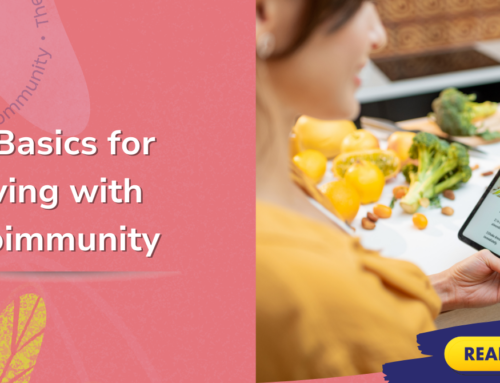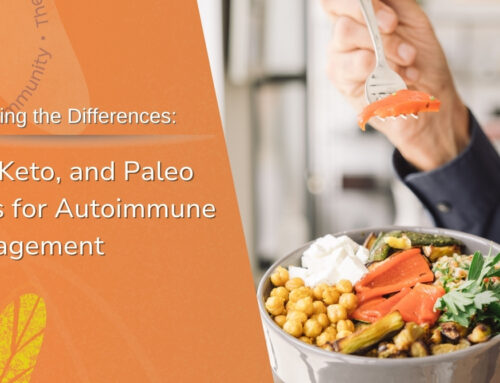
Nutrition Ins and Outs this 2024 by ThriveGuide™ Alexa
Alexa Federico (@girlinhealing) is a passionate functional nutritionist dedicated to transforming lives since 2017. Her journey began with a personal battle against Crohn’s disease, igniting a fervor for holistic wellness. With a toolbox of food, nature, and lifestyle strategies, Alexa empowers clients to thrive with IBD and chronic conditions. As an author, educator, and remote practitioner, she leverages her expertise to guide others toward vibrant health. With a penchant for lifelong learning and a knack for functional blood chemistry, Alexa continues to evolve her practice, driven by a mission to heal and inspire.
Hey, Thrivers! It’s a brand-new month and we’re so excited to keep you updated with the latest trends in everything related to autoimmune, particularly our favorite – nutrition! Just like the ever-changing landscape of social media, the world of nutrition also has its own set of “ins and outs.”
Join our very own ThriveGuide™ Alexa Federico as she walks us through the exciting trend of nutrition ins and outs, highlighting the things we should aim to accomplish and leave behind in 2024 for our autoimmune health. Let’s get started!
1. Redefining Mealtime in the Modern World
Out: The Habit of Eating on the Go
Gone are the days when eating was just another task to tick off your to-do list. The habit of munching mindlessly while multitasking may seem like a time-saver, but it’s a joy-stealer.
We’re living in a whirlwind of meetings, emails, and deadlines, where meals often become afterthoughts. This mindless eating not only robs us of the pleasure found in a good meal but can lead to overeating and a disconnection from our body’s cues.

Admittedly, I’ve been guilty of this in the past too. My motivation to change came from how my body reacts when I eat mindlessly on the go. While not everyone may experience such a reaction, this is a common issue due to our busy schedules.
In: Cultivating Mindful Eating Experiences
It’s time to turn the tables and transform mealtime into a moment of zen in our chaotic lives. Mindful eating invites us to savor each bite, leading to a more satisfying and healthier eating experience.
Tip:
Start small: dedicate one meal a day to be your “mindful meal” — no screens, no stress, just you and your food. See how this small change can make mealtime a highlight rather than a footnote in your day.
2. Emotional Resilience Through Food Choices
Out: Using Food as an Emotional Crutch
We’ve all been there — reaching for a pint of ice cream after a rough day. While comforting in the moment, it’s a slippery slope from comfort eating to dependency.
Food, while comforting, shouldn’t be our go-to therapist. Stress-eating can quickly become a habit, masking our emotional needs rather than addressing them.
In: Finding Solace in Nature and Movement
Instead of opening the fridge, open the door to nature and movement. Activities like dance, yoga, or simply walking can be incredibly therapeutic and help manage stress and emotions without the calorie count.

Dancing around to my favorite upbeat music makes me feel good and light. It may seem silly, but energetically, the physical movement helps dispel stress, far more effectively than eating. The true relief comes from activities such as yoga, going for a walk, or appreciating the beauty of nature, not food.
3. Evolving Our Relationship with Food
Out: Guilt and Shame in Eating
It’s high time we break up with the guilt that too often accompanies our meals. Food is not the enemy, and eating should not be a battleground.
The emotional rollercoaster of guilty eating can affect our self-esteem and relationship with food. It’s crucial to address these feelings head-on and seek a balanced perspective on eating.

In the early stages of my journey, I felt odd and alienated whenever I consumed unfamiliar foods. Embracing a completely different diet can feel isolating, particularly when your family does not follow the same eating habits. The key is to shift the mindset and understand that you are eating this way for your own benefit. It doesn’t make you an anomaly or a burden. This way of eating promotes my health, showing that my needs are important.
In: Celebrating Food as a Source of Nourishment
Let’s shift our focus from calorie-counting to celebrating food’s role in our health and happiness. Food is fuel, but it’s also pleasure, tradition, and art.
Tip:
Start by expressing gratitude for your meals and recognizing the effort and journey behind each ingredient. This mindset can transform your mealtime into a nourishing ritual, both for the body and the soul.
4. Food in the Social and Cultural Context
Out: Hiding Dietary Choices Due to Social Pressure
The fear of judgment for our dietary choices can lead us to conceal rather than celebrate our eating habits. But at what cost?
Navigating social settings while trying to stay true to personal dietary choices can be daunting. Yet, compromising our health and happiness to fit in is a recipe for discontent.
In: Proudly Owning Your Dietary Habits
It’s time to dine out loud and proud, regardless of our dietary preferences. Whether you’re vegan, gluten-free, or sugar-conscious, your choices are valid and worth respecting.

For instance, being Italian, I began a gluten-free diet 17 years ago. My grandmother, who prepared everything from scratch, made a significant effort to incorporate gluten-free flour into her baking. However, negotiating family gatherings that revolve around food and maintaining inclusion can be challenging. So, shedding feelings of shame or guilt for non-participation and finding ways to remain part of our social environments while not focusing solely on food is essential. It all boils down to maintaining a social connection.
Tip:
Never underestimate the power of open, honest conversation about your dietary needs. More often than not, people are willing to accommodate and even curious to learn more.
5. Mindfulness and Tradition in Our Eating Practices
Out: The Obsession with Counting Calories and Macros
While nutrition facts have their place, they’ve taken the joy out of eating for many. Food is more than numbers; it’s nourishment, culture, and joy.
Focusing solely on calories and macros can lead to a disconnection from the true essence of eating: to fuel and revel in the diverse flavors and textures of food.
In: Prioritizing Food Quality and Ingredients
Let’s redirect our attention to the quality of the food on our plates, celebrating the origins, traditions, and craftsmanship behind our meals.
Tip:
Embracing the mindfulness and tradition in our eating practices enriches our dining experience beyond measure. It’s about rekindling a relationship with food that’s based on respect, appreciation, and enjoyment.
By weaving the principles behind these nutrition ins and outs into our daily lives, we not only enhance our own well-being but also forge a deeper connection with the world around us. ThriveGuide™ Alexa encourages us to embark on this journey with an open heart and a curious palate, ready to rediscover the joy of eating in its purest form.
Our ThriveGuides™ have been hand-picked for their expertise, autoimmune wisdom, and all-around awesomeness to provide support, share their personal experiences, and guide you on your journey towards thriving with autoimmune conditions.
Can’t get enough of food for autoimmune health? Catch Alexa and the rest of our ThriveGuides™ weave their magic LIVE in The Autoimmunity Community™ as part of our vetted resources exclusive for our members. Collectively at BrightlyThrive™, we are reimagining autoimmunity together, and we’re on the lookout for future Thrivers to join us on this exciting journey!
Do you know a friend or loved one who’s living with autoimmunity as well? Feel free to send them our way via brightlythrive.com so they, too, can tap into the healing power of social connection and being part of a supportive community where functional nutrition and integrative wellness are celebrated!
TAGS:
CATEGORIES:












